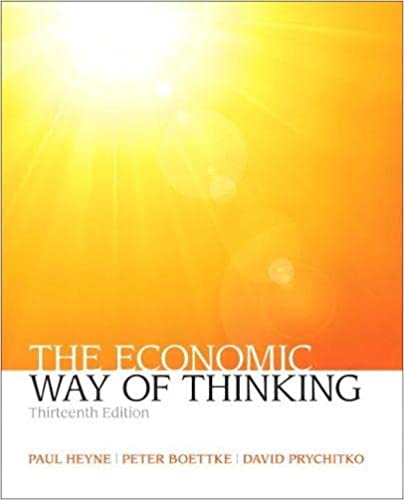
The Economic Way of Thinking 13th Edition by David Prychitko, Peter Boettke, Paul Heyne
Edition 13ISBN: 9780132992695
The Economic Way of Thinking 13th Edition by David Prychitko, Peter Boettke, Paul Heyne
Edition 13ISBN: 9780132992695 Exercise 14
A Reason-Rupe poll found that two-thirds of Americans favored President Obama's proposal for a $9.00 per hour minimum wage.
( a) Do you think unskilled workers as a whole-and perhaps even society as a whole-would be better off if the minimum wage were increased to $9.00 per hour?
(b) Some Occupy Wall Street protesters have called for a $20 an hour minimum wage. Would that increase the incomes of the working poor in general?
(c) Why settle for $20 an hour? Suppose instead they insist on a $50 an hour minimum wage? Wouldn't almost everybody be richer?
(d) Unions often call for higher minimum wages, even though unions represent skilled workers and therefore do not directly benefit from a minimum-wage increase. Recalling from Chapter 3 how an increase in the price of a substitute good will tend to raise the demand for the good in question, can you make an argument that wages for union members will tend to increase when the minimum wage for unskilled, nonunion labor is increased?
(e) In his book The State Against Blacks , economist Walter Williams observes the following:
Youth unemployment, even during relatively prosperous times, ranges from two to three times that of the general labor force. Black youth unemployment, nationally for more than a decade, had ranged from two to three times the unemployment rate for white youths. In some metropolitan areas it is reported that black youth unemployment exceeds 60 percent!
Why is youth unemployment, and especially black youth unemployment, so high? Williams argues it's a direct effect of minimum-wage legislation. Can you construct the argument?
( a) Do you think unskilled workers as a whole-and perhaps even society as a whole-would be better off if the minimum wage were increased to $9.00 per hour?
(b) Some Occupy Wall Street protesters have called for a $20 an hour minimum wage. Would that increase the incomes of the working poor in general?
(c) Why settle for $20 an hour? Suppose instead they insist on a $50 an hour minimum wage? Wouldn't almost everybody be richer?
(d) Unions often call for higher minimum wages, even though unions represent skilled workers and therefore do not directly benefit from a minimum-wage increase. Recalling from Chapter 3 how an increase in the price of a substitute good will tend to raise the demand for the good in question, can you make an argument that wages for union members will tend to increase when the minimum wage for unskilled, nonunion labor is increased?
(e) In his book The State Against Blacks , economist Walter Williams observes the following:
Youth unemployment, even during relatively prosperous times, ranges from two to three times that of the general labor force. Black youth unemployment, nationally for more than a decade, had ranged from two to three times the unemployment rate for white youths. In some metropolitan areas it is reported that black youth unemployment exceeds 60 percent!
Why is youth unemployment, and especially black youth unemployment, so high? Williams argues it's a direct effect of minimum-wage legislation. Can you construct the argument?
Explanation
(a)The unskilled as a whole and society ...
The Economic Way of Thinking 13th Edition by David Prychitko, Peter Boettke, Paul Heyne
Why don’t you like this exercise?
Other Minimum 8 character and maximum 255 character
Character 255


